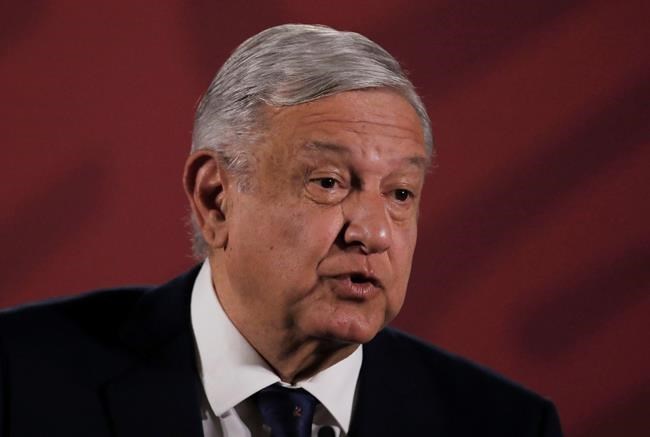
Mexico's President Andres Manuel Lopez Obrador gives his daily news conference at the presidential palace in Mexico City, Tuesday, March 24, 2020. Lopez Obrador's government is reluctant to implement some of the extreme measures and lockdowns seen in Europe or the United States to help stop the worldwide spread of the new coronavirus. (AP Photo/Marco Ugarte)
Republished March 26, 2020 - 7:01 PM
Original Publication Date March 26, 2020 - 11:06 AM
MEXICO CITY - More than a year into his term, Mexican President Andrés Manuel López Obrador attended his first international summit Thursday, though the topic — the coronavirus pandemic —meant he didn't have to leave home to get there.
López Obrador, who has not left Mexico since taking office Dec. 1, 2018, urged the online gathering of the world's top 20 industrialized economies to help those with fewer resources. He proposed that the United Nations take control of “everything related to medicine and equipment” to combat the virus so that there is an even playing field.
“When these things occur, he with the greatest economic possibilities hoards,” López Obrador said at his daily news conference, which followed the G20 session.
The president's concern about Mexico’s already stalled economy and the huge swath of the population that would not have the means to weather a shutdown have informed the government's hesitancy to take more restrictive steps to slow the virus' spread.
But Thursday, Mexico's federal government shut down all but its essential activities, while López Obrador took time in his daily news conference to review the illness' symptoms and urge people stay at home.
López Obrador told the other world leaders that the poor must be a focus of plans for economic recovery after the pandemic.
“You must give special attention to the family micro-businesses and to all those working in the so-called informal economy, those who make their way in life any way they can,” he said later at his daily news conference.
He also specifically noted the ability of the neighbouring United States to spend billions of dollars on in-demand items like ventilators for those in most critical need, making such things harder for other countries to find and driving up the cost.
López Obrador has long maintained that he has too much to do in Mexico to spend time travelling abroad like other heads of state. He has delegated that work to his foreign secretary while at the same time sharply curtailing international travel by other government officials as part of his austerity measures.
Mexico had 585 confirmed cases of the new coronavirus as of Thursday and eight people have died.
López Obrador has been criticized for not taking more aggressive measures against the pandemic and downplaying it as he encouraged Mexicans to go about their business.
His government continues to send mixed messages. He said his health advisers told him Mexico should be in better shape by April 19. But earlier this week, Health Undersecretary Hugo López-Gatell said if the government's plan to flatten the epidemiological curve and keep infections at a manageable level works, the epidemic may not peak in Mexico until August.
Eduardo González Pier, a former undersecretary in Mexico's health ministry and a fellow at the Wilson Center's Mexico Institute, said Mexico heads into this crisis with an under-resourced public health system suffering from consecutive years of budget cuts and an economy already in recession.
Add in the plunging price of oil, an important source of income for the government, and Mexico is facing what could be its most severe crisis in decades from a very weakened position.
“The health system will be overloaded much faster than other countries have experienced and this is going to increase probably the number of deaths or the mortality rate of the confirmed cases," González said during a discussion Thursday organized by the institute.
How much faster is an unknown, in part because of Mexico's extremely limited testing. The last figure the government gave this month was that it had 9,100 test kits available and had used only a fraction of them.
“There’s consensus, I would say, that testing has not been deployed as it should be, especially if you look at the successful examples, basically Asian countries — Singapore, Korea, Japan — where extensive testing was done," González said. “And unless generalized testing is allowed in the system, it is going to be very difficult to really hard to measure the magnitude of the problem and how far down the curve you have managed to push.”
Mexico's strategy of flattening the curve could also have an economic toll that in turn could produce its own negative health effects, he said. Stalling the economy for an extended period will reduce the resources the government has to confront the problem and take a personal toll on those who find themselves without income.
“So I think we have to rethink a little bit what it means to flatten the curve in Mexico, especially when we have a very weak economy and at the same time we also have a very weak health system,” González said.
News from © The Associated Press, 2020